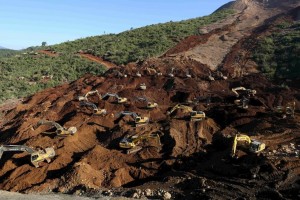Rivers of Green Blood
By Burma Partnership • December 10, 2015Burma’s multi-billion dollar jade industry is coming under close scrutiny as two new reports demonstrate the corrupt, unaccountable, and dangerous industry that is driving conflict, a heroin epidemic, and hazardous working conditions.
On 23 October, 2015, London-based NGO, Global Witness, released a report, “Jade: “Myanmar’s Big State Secret,” which outlines extensively the jade mining operations in Hpakant, Kachin State. The report highlights the stakeholders who benefit from this $31 billion dollar per year trade, and the devastating effects that this has on the local communities, wider Kachin State, and the country as a whole. The follow up report, “Lords of Jade,” released on 3 December 2015, further details the operations of the biggest players in the jade trade, namely the drug lord and United Wa State Army (UWSA) – affiliated, Wei Hsueh Kang, an individual with a $2 million bounty on his head issued by the US Government for his role in the narcotics trade.
According to Global Witness, those who benefit most extensively from the trade include, not only Wei Hsueh Kang and the UWSA, but also companies headed by former head of the military junta, Senior-General Than Shwe and his family, the two companies run by the Burma Army, individuals and companies related to high-level members of the ruling party, the Union Solidarity and Development Party, and various other crony businessmen. Ethnic armed groups also gain financial rewards, and in particular, the Pa-O National Organization, an ethnic militia that has long standing ties with the previous junta and the current government, through its affiliated company, Ruby Dragon.
Much of the jade is smuggled into China, and combined with cronyism, corruption and the implied threat of force from the powerful UWSA, the results are that tax revenues or indeed any benefits from this huge industry do not help the people of Kachin State or Burma. Non-taxed profits are enjoyed by the Burma Army and its allies, and are thus used to fund the continued offensives against the Kachin Independence Army that has continued unabated since the Burma Army broke a 17 year ceasefire in June 2011.
Yet despite the hundreds of millions of dollars that such well-connected companies, armed groups, and individuals make each year through jade, the conditions that migrant workers who come from all over Burma endure as they mine for jade are often perilous. Nothing reveals the hazardous existence that jade miners in Hpakant experience more than the recent landslide that killed at least 114 people. Mountains of over 60 meters of dumped soil in which local laborers search for discarded jade are common in Hpakant, and despite the dangers, many people erect huts nearby. Poor regulation and enforcement by relevant authorities means that such tragedies are commonplace.
It is not just the working conditions that threaten the lives of migrant workers, but the social consequences in these communities as a result of the mining industry are shocking. Many miners become addicted to heroin which is taken as a means to endure the long and painful working conditions, while HIV and prostitution are rife.
The jade industry is worth billions of dollars. Global Witness estimates that it is worth up to 48% of Burma’s annual GDP. Not only are the natural resources of Kachin State and Burma being siphoned off, but it is also fuelling armed conflict, damaging the environment, uprooting local communities from their homes and livelihoods, thus becoming IDPs, and creating perilous working conditions for migrant workers trying to escape poverty. These conditions are created by the generals, warlords, and crony businessmen that profit from the jade industry.
The insatiable demand for jade from China means this problem will not go away soon, and as Global Witness report points out, it is of utmost importance that the incoming government address these disastrous problems. Not only domestically, but international efforts, such as the Extractive Industries Transparency Initiative (EITI) must be utilized to push for transparency in the industry. Jade has the potential to greatly benefit the people of Burma, especially local indigenous communities. Yet unless structural changes are implemented that tackle issues such as including natural resource-sharing in a federal form of governance and the current peace process, fully initiating and implementing transparency initiatives like EITI, investigating corruption and ending impunity for those found guilty, it will continue to fuel exploitation, conflict, and desperation.
Tags: ASEAN, Burma Partnership, Business and Human Rights, China, Crimes against humanity, Extractive Industries Transparency Initiative, Global Witness, Human Rights, Kachin State, Union Solidarity and Development PartyThis post is in: Blog
Related PostsBurma Partnership Celebrates Continuing Regional Solidarity for Burma and Embraces the Work Ahead for Progressive Voice
Myanmar’s New Dawn :Opportunities for Aung San Suu Kyi and U.S.-Myanmar Relations
Expanding People’ Solidarity for a Just and Inclusive ASEAN Community
Civil society launches #FreeThe5KH campaign in support of the imprisoned ADHOC staff and NEC official
Myanmar logging ban a major step to forest sector reform










 All posts
All posts